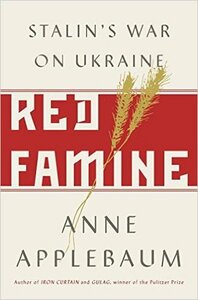Take a photo of a barcode or cover
I will come back to this one someday, but for right now, it's too raw, too difficult.
challenging
dark
informative
reflective
sad
slow-paced
challenging
dark
informative
slow-paced
dark
informative
challenging
dark
sad
slow-paced
I am giving this 5 stars because how relevant this book is for the situation in Ukraine in 2022. Her description of the 1932-34 Famine in Ukraine, perpetrated by the Soviets is very detailed and interesting.
challenging
dark
informative
sad
slow-paced
This was a difficult read, but a necessary one. I knew about the Holodomor in general, but this book has so many harrowingly specific stories and accounts. I'll never forget it.
"The first lesson which is becoming an integral part of Ukrainian consciousness is that Russia has never had and never will have any other interest in Ukraine beyond the total destruction of the Ukrainian nation."
It always was, and currently is, the plan. And if there's one thing I have learned, it's that the spirit of the Ukrainian people is indomitable. The fight will go on. Glory to Ukraine. Слава Україні!
Graphic: Genocide, Grief
Moderate: Animal death, Child death, Death, Death of parent
Minor: Cannibalism
informative
reflective
medium-paced
A well researched work for a general audience on a lesser known event in the Soviet Union. Nevertheless, the book fails to take into consideration the larger picture, often centering around national and nationalist arguments; additionally, the author's sentiments seem to overtake. However, an interesting last chapter and epilogue.
So I complained about the overload of dates and names in the first chapter or two, saying this may be complicated for a non-specialist? Forget it. Once you brave on and focus on the bigger picture, at some point you forget it and just follow the narrative.
And the narrative was not kind. Applebaum explains in great detail how the USSR operated and why it was hell on Earth through example of Ukraine. She starts with context explaining the regional complexities and tensions since 19th century focusing on the major geopolitical tension: is Ukraine its own entity or not? This is something where most major conflicts, disagreements, tensions etc. in the region spring from. Even the current Russia’s war against Ukraine. Because some (cough cough) think it isn’t. And when it isn’t, you can treat the poor country however you wish. Especially when it has resources you’re too lazy or too stupid to cultivate.
Poor Ukraine.
Applebaum explains how these tensions fit in with the local heterogeneity in late 1910s and early 1920s. One land, multiple visions. The Russian Revolution. Bolsheviks win. What happens then?
Applebaum explains how from hopeful moods, even in the presence of Bolshevism in Ukraine in 1920s and from stable chaos the country gradually shifts to a total, unimagineable horror in 1930s. And everything in between. You want to implement an absurd policy? Force it. People do not comply? Force it even harder, by physical means. People resist? Punish them disproportionately and make everone watch. Wash their brain with propaganda. Make them paranoid. Make them report others to the authorities. Make them fear, make them distrust everyone. Even their own neighbours, friends, families.
Someone complains? Resists? Pester them. When you had your fun, destroy them. Cruelly. Just because. Too much? Give them a break. Then punish them more and make them regret their own resistance.
Applebaum describes Stalin’s pet collectivisation, forced on Ukrainian peasants with its absurdities. Mass rip-off and enslavement of people. Requisitions, forced displacements. The processes of how the state takes away everything from you and makes you do what it wants. And how it oscillates between more or less severe in the process.
And then, when a country-level agricultural system fails because of your stupid policies and no will of cooperation from the oppressed, blame them and make them regret. Everything. And use the opportunity to kill any leftovers of national movements.
One of the cruellest bits to me was how the government set up mass requisitioning of food when country was already starving because of shit policies. Applebaum describes it powerfully, highly visually and depicts the mass effect incredibly well. What nearly made me cry was how come those who did it - take away all the food from starving peasants to make them starve more - did it? And on such mass level? Applebaum tries to explain it but I still struggle to grasp it.
The aftermath is expected but difficult to stomach. Even when you know. Applebaum describes famine very graphically. Knowing it was caused intentionally makes your heart bleed. Especially when you read about propaganda saying it was made up. Bodies on the streets, fields, cruel, painful, torturous deaths, animals - cats, dogs - eaten to survive, whole villages starved to death, people burried alive or people eaten by other people... Made up.
If this book does not explain what The Soviet Union was, I don’t know what does. Literature on Chernobyl, maybe. But I almost don’t know which is more horrible - pure viciousness and spite to obtain your aims or hubris and criminal negligence. Either translate horribly on people. And yet: to cause famine to teach someone a lesson...
Explains why that system collapsed. And how Ukraine stands up today.
Good book, worth to read, no matter how painful. Applebaum portrays cultural background well and explains how that may have influenced the whole so that things went where they went. Take horrors aside and it does explain changing society of Ukraine in the first half of the 20th century. Its dynamics, sensitivities. Relationship with the era. Yes, this book does trigger strong emotions. Be careful when reading this if you are sensitive. But it is also informative too. Importantly, it shows how utter evil can play us just because it can. And what it costs.
And the narrative was not kind. Applebaum explains in great detail how the USSR operated and why it was hell on Earth through example of Ukraine. She starts with context explaining the regional complexities and tensions since 19th century focusing on the major geopolitical tension: is Ukraine its own entity or not? This is something where most major conflicts, disagreements, tensions etc. in the region spring from. Even the current Russia’s war against Ukraine. Because some (cough cough) think it isn’t. And when it isn’t, you can treat the poor country however you wish. Especially when it has resources you’re too lazy or too stupid to cultivate.
Poor Ukraine.
Applebaum explains how these tensions fit in with the local heterogeneity in late 1910s and early 1920s. One land, multiple visions. The Russian Revolution. Bolsheviks win. What happens then?
Applebaum explains how from hopeful moods, even in the presence of Bolshevism in Ukraine in 1920s and from stable chaos the country gradually shifts to a total, unimagineable horror in 1930s. And everything in between. You want to implement an absurd policy? Force it. People do not comply? Force it even harder, by physical means. People resist? Punish them disproportionately and make everone watch. Wash their brain with propaganda. Make them paranoid. Make them report others to the authorities. Make them fear, make them distrust everyone. Even their own neighbours, friends, families.
Someone complains? Resists? Pester them. When you had your fun, destroy them. Cruelly. Just because. Too much? Give them a break. Then punish them more and make them regret their own resistance.
Applebaum describes Stalin’s pet collectivisation, forced on Ukrainian peasants with its absurdities. Mass rip-off and enslavement of people. Requisitions, forced displacements. The processes of how the state takes away everything from you and makes you do what it wants. And how it oscillates between more or less severe in the process.
And then, when a country-level agricultural system fails because of your stupid policies and no will of cooperation from the oppressed, blame them and make them regret. Everything. And use the opportunity to kill any leftovers of national movements.
One of the cruellest bits to me was how the government set up mass requisitioning of food when country was already starving because of shit policies. Applebaum describes it powerfully, highly visually and depicts the mass effect incredibly well. What nearly made me cry was how come those who did it - take away all the food from starving peasants to make them starve more - did it? And on such mass level? Applebaum tries to explain it but I still struggle to grasp it.
The aftermath is expected but difficult to stomach. Even when you know. Applebaum describes famine very graphically. Knowing it was caused intentionally makes your heart bleed. Especially when you read about propaganda saying it was made up. Bodies on the streets, fields, cruel, painful, torturous deaths, animals - cats, dogs - eaten to survive, whole villages starved to death, people burried alive or people eaten by other people... Made up.
If this book does not explain what The Soviet Union was, I don’t know what does. Literature on Chernobyl, maybe. But I almost don’t know which is more horrible - pure viciousness and spite to obtain your aims or hubris and criminal negligence. Either translate horribly on people. And yet: to cause famine to teach someone a lesson...
Explains why that system collapsed. And how Ukraine stands up today.
Good book, worth to read, no matter how painful. Applebaum portrays cultural background well and explains how that may have influenced the whole so that things went where they went. Take horrors aside and it does explain changing society of Ukraine in the first half of the 20th century. Its dynamics, sensitivities. Relationship with the era. Yes, this book does trigger strong emotions. Be careful when reading this if you are sensitive. But it is also informative too. Importantly, it shows how utter evil can play us just because it can. And what it costs.





